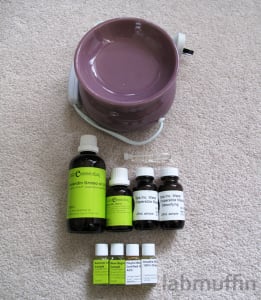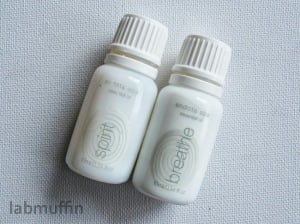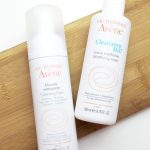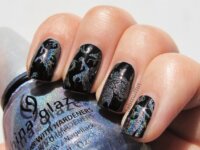As a scientist whose PhD involved natural product synthesis and pharmacology (that’s where you get chemicals out of nature (plants, bacteria, marine sponges etc.) in the hopes that they’ll become, or lead to the development, of a useful drug one day), I find alternative medicine very interesting. While a LOT of it is hokum, designed to trap innocent people into buying very expensive water and/or urine, there are definitely a lot of untapped treasures in there awaiting proper evaluation.
One of the things I’ve been getting into is aromatherapy (you may have guessed from my obsession with stuff that smells good). While I don’t believe a word of the claims about energy centres, strengthening immune systems and of course, that word that always marks a scam, detoxification – there is actually some evidence on essential oils having effects on mood (some researchers use the term aromachology to specify the research-based application of scent’s psychological effects, but to me, that’s splitting hairs).
There’s some (weak) evidence that lavender and lemon oils in particular are good for stress relief and elevating mood. While it’s doubtful that they’ll work as well as properly prescribed antidepressants or therapy for clinical depression or anxiety, they’re definitely healthier than binge-eating a whole block of chocolate when you’re having one of those days (I need to keep reminding myself of that).
 |
| My usual coping mechanism. |
I’ve been using the electric oil burner I picked up at Spa and Beauty Expo to burn essential oils. I’ve been loving Endota Spa‘s lavender-heavy Spirit* blend for destressing, and sometimes just straight up Lavendin Grosso oil from the Sydney Essential Oil Company (lavandin is a lavender hybrid).
Some inhaled essential oils are also useful for breathing problems. Eucalyptus and peppermint oils (such as in Endota Spa‘s essential oil blend Breathe* and Sydney Essential Oil Company‘s blend, also aptly named Breathe) clear mucus and reduce irritation, thanks to their high components of eucalyptol and menthol respectively.
There are a few more essential oils which have scientifically researched properties – for example, tea tree oil is antiseptic. However, anything that genuinely works will have side effects, regardless of whether it’s natural or synthetic. While essential oils may sound natural and safe, always research possible risks before use. For example, lemon oil will make your skin more sensitive to sunburn if you apply it straight on the skin, peppermint and eucalyptus can slow breathing to a dangerous extent in young children, and most essential oils are skin irritants, and poisonous if you eat them.
References
RS Herz, Aromatherapy facts and fictions: a scientific analysis of olfactory effects on mood, physiology and behavior, Int J Neuroscience 2009, 119, 263.
S Inouye, T Takizawa and H Yamaguchi, Antibacterial activity of essential oils and their major constituents against respiratory tract pathogens by gaseous contact, J Antimicrob Chemother 2001, 47, 565.
UR Juergens, U Dethlefsen, G Steinkamp, A Gillissen, R Repges and H Vetter, Anti-inflammatory activity of 1.8-cineol (eucalyptol) in bronchial asthma: a double-blind placebo-controlled trial, Respiratory Medicine 2003, 97, 250.
Products marked * provided for editorial consideration, which did not affect my opinion. For more information, see Disclosure Policy.








Thanks so much for sharing such useful info! I once saw someone suggest ‘all natural’ skin care products were superior – since they were natural, you didn’t have to worry about allergies. *facepalm* I think people have a hard time understanding the difference between a side-effect and an allergy.
Yep! And that natural extracts have a billion things in them, while synthetic versions only have one or two things, so you’re way more likely to be unexpectedly allergic to something in the natural extract. If you think about the things people are commonly allergic to – pollen, dust mite dander, peanuts, shellfish – a lot of them are natural!
The only oils that can be applied directly to the skin without a carrier (vegetable oils suck as jojoba, cream/lotions, dissolved in bath with a dispersant) are lavender, tea tree and Australian Sandalwood.
I was once a skeptic too…
Thanks for the info!
I hope I will always be a skeptic – always critically assessing people’s claims, and not accepting claims without sufficient evidence! If there’s ever sufficient reliable, valid evidence of the effects of aromatherapy on strengthening immune function or vitality centres beyond a placebo effect (or if there’s such thing as a vitality centre), or that humans have toxins that the efficient detox systems already in our bodies can’t handle and that aromatherapy can get rid of them, I will happily tell everyone I know about it!
Great post! My favorite part? Your illustration! Love it. 🙂
Thanks Emiline! Little cartoon Muffin is how I look in my head 🙂
My mother was into aromatherapy when I was a kid, so I used to hear a fiar bit about it. I was always told that lavender helped releave stress and headaches, but for me the smell causes headaches, go figure!
How annoying. Painkillers for you!
The essential oils absolutely smell great – some of them. But sadly they are added to most ‘natural’ skin care products these days, although many of the volatile oils are strong allergens and can be cytotoxic as well.
Yes, it’s surprising how many “natural” things are actually worse for you than synthetic versions – often that’s why the synthetic versions were made in the first place!
Awesome post!! 😀 I love aromatherapy (and stuff that smells good! XD), but it is scary how many people out there think that because something is natural, it is safe. I am so glad you brought that point up in your post! 😀
Definitely! It goes hand in hand with the idea that “chemicals” are bad, when everything (oxygen, water, fruit) is made of chemicals!
This is why I have this blog on my blogroll. Awesome!
I’m flattered! 🙂
Yearn for to get Aromatic essential oil! Aromatic massage can reduce cortisone levels in children having juvenile rheumatoid arthritis.
Faithfully desire essential oil! Its hair treatments are highly effective, especially in the case of lice and dandruff. The oil has a cooling effect on the head, which in turn improves blood circulation in the scalp. This promotes hair growth and improves the condition of the hair.
Excellent post. I love it. essential oils
“… lemon oil will make your skin more sensitive to sunburn if you apply it straight on the skin”. Just here to say that lemon and some other citrus essential oil can have that effect even if diluted, it doesn’t have to be straight (never a good idea for applying essential oils anyway). It depends on the type of oil, if it’s distilled or cold pressed, and how diluted it is.